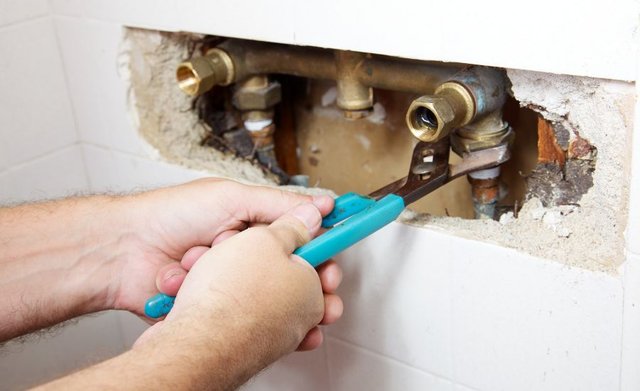.jpg)
Have you ever noticed marks on your walls or a musty smell in parts of your house? These could indicate a water leak within your walls. Ignoring signs can result in damage to the structure and the growth of mold. In this article, we will discuss how to identify wall leaks, their causes, and what actions you can take to resolve them.
How Do You Know If You Have A Leak In The Wall?
Indications of a Wall Leak
Visible Stains
Water leaks often leave marks on walls or ceilings. These marks may appear as spots or lines suggesting water seepage from behind the wall.
Musty Smell
A persistent musty odor in areas of your home might signal hidden moisture accumulation typically caused by a wall leak.
Peeling or Bubbling Paint
If the paint on your walls is peeling or bubbling, it could be due to water damage. Moisture from a leak can cause the paint to lose its grip and begin to peel off the surface.
Warped or Sagging Walls
In instances extended exposure to water can result in structural harm leading walls to warp or droop. This is a sign of water infiltration, behind the wall.
Rising Water Bills
If you notice a spike, in your water bill but haven't been using water it could be a sign of an unseen leak possibly lurking behind your walls.
Common Reasons for Wall Leaks
Understanding the triggers for wall leaks can help you tackle the root cause effectively. Some typical reasons include:
Faulty Plumbing
Hidden leaky pipes within walls are often to blame for wall leaks. Pipes that are corroded or damaged may develop cracks or holes over time leading to water leakage.
Roof Leaks
Water from a roof leak can seep down through the walls causing damage to the surfaces. It's essential to inspect your roof for missing shingles, damaged flashing, or other issues to prevent wall leaks.
Sealed Windows and Doors
Sealed windows or doors can allow water to enter your home, especially during heavy rain or storms. Over time, this moisture can seep into the walls. Result in leaks.
Cracks in Exterior Walls
Speaking with Joe Hayden, Louisville Realtor, he adds this: "Structural cracks in the walls of your house can serve as entry points for water. These cracks may form due, to settling, temperature changes, or foundation problems enabling water infiltration into the walls. Excessive moisture levels in your home can result in humidity, leading to condensation forming on walls. This can eventually cause issues such as mold growth and water damage. If you suspect a leak in your wall based on the mentioned signs, it's important to act to avoid harm."
Here are the steps you can take:
• Thoroughly inspect the area for any indications of water damage, such as stains peeling paint, or walls that appear to be sagging. Focus on areas near plumbing fixtures, windows, and doors.
• Keep an eye out for mold growth as mold tends to thrive in environments. Look for spots, fuzzy patches, or a musty smell. If you find mold address the moisture problem immediately to prevent its spread.
• In case of a suspected plumbing pipe leak turn off the water supply to your home to prevent damage, from occurring. The shut-off valve is typically located near your water meter. Where the main water line enters your home.
Seeking advice is recommended when dealing with leaks as experts can utilize specialized tools, like moisture meters and thermal imaging cameras to detect hidden leaks in walls. It's crucial to address the root cause of the leak once it's identified, which may involve fixing pipes, sealing gaps around windows and doors, or resolving roof issues.
Related: A Newley Remodeled Fixer Upper - Rent it or Sell it? - by Tuscana Properties
To prevent wall leaks and related damage:
• Regularly inspect your plumbing system, roof, and exterior walls to catch any problems on.
• Ensure ventilation in areas with high humidity, such as bathrooms, kitchens, and basements.
• Apply sealants. Caulking around openings like windows and doors to create a water seal.
• Monitor your water bill for increases that could indicate a leak.
• Act promptly if you observe any signs of a leak, without delay.
Taking action can prevent harm and expensive fixes. Additional: What to know about a sump pump
In Conclusion
To sum up, it's crucial to identify and fix wall leaks to shield your home from water damage and mold formation. By recognizing the indications of a wall leak, grasping the reasons behind it, and implementing actions, you can protect the integrity of your home for the long haul. If you suspect a wall leak, don't delay in seeking expert help to pinpoint and address the problem accurately.